If there’s one symbol that’s synonymous with Thailand, it’s the elephant.
Emblazoned on t-shirts, acting as the mascot of the kingdom’s (arguably) best beer, and tattooed on the ankle of many a visiting wanderer, the friendly elephant is the perfect representative of the nation known for its welcoming atmosphere and stunning wilderness.
Beyond its contemporary symbolism, the elephant holds a profound historical significance in Thailand. Dating back hundreds of years, the Buddhist and Hindu communities considered elephants culturally and spiritually important.
In the past, elephants were utilized in the logging industry, a practice that was inherently cruel. However, as the logging industry modernized with machinery, many elephants and their mahouts found themselves redundant, ushering in a distressing chapter of further exploitation.
With their allure as a captivating attraction, mahouts migrated to tourist hubs, showcasing their elephants for a fee, allowing tourists to feed and pose with these magnificent creatures. Some elephants were assimilated into the riding industry, and many were bred solely for this purpose.
While some organizations promote ethical and conscientious elephant encounters, a disheartening reality persists with mahouts parading elephants in tourist areas and numerous businesses across Thailand (and Southeast Asia) selling elephant rides.
Despite the initial allure of getting up close to these majestic creatures, elephant riding is deeply problematic, inherently cruel, and continually jeopardizes the health and lives of these magnificent beings.
In this post, I take a look at the 10 key reasons why you should never ride an elephant.
I have included three videos, the first of which, I should warn you in advance, contains very disturbing footage. The second is a stark reminder of the danger of elephant riding. The third is a documentary, which also contains footage that you may find disturbing, but at the same time is an insightful watch.
10 Reasons You Should Never Ride Elephants In Thailand
1. The “Breaking in” Process
The process of “breaking” an elephant, known as phajaan or “the crush,” is a traditional yet deeply disturbing practice that captive elephants often endure, although few trainers openly acknowledge its brutal nature.
In its natural state, a wild elephant would never willingly allow a human to approach, let alone ride it. To overcome the innate resistance of these majestic creatures and compel them to submit to human control, trainers resort to extreme measures. Elephants are often chained or confined to cramped enclosures where their movement is severely restricted.
This coercive process involves various forms of abuse, including beatings, deprivation of food and water, and the use of bullhooks—sharp-pointed spikes employed to direct and control elephants. The severity of this traumatic treatment can extend over weeks or even months, causing profound suffering and breaking the spirit of these intelligent beings.
It's essential to shed light on the harsh realities of this practice, fostering awareness and advocating for more humane methods in the treatment and training of elephants. By understanding the cruelty involved in the phajaan process, we can work towards ensuring the welfare and ethical treatment of these magnificent animals in captivity.
2. The Elephants Are Often Overworked
Programs promoting elephant riding are frequently exploitative, reaching a point where exhaustion and fatigue-induced fatalities become not only common but also inevitable.
Over the years, numerous elephants have succumbed to overwork and exhaustion, particularly prevalent in Thailand and Southeast Asia, where the Kingdom alone hosts nearly 3,000 working elephants.
Despite the glaring signs of suffering exhibited by these magnificent creatures, including the toll taken by prolonged labor under the scorching sun, owners and trainers often turn a blind eye. Their primary focus is maximizing profits by squeezing multiple days' worth of labor into a single, grueling session, exacerbating the physical and mental strain on these animals.
This disregard for the well-being of elephants highlights the urgent need for a shift in perspective and practices within the industry. Advocacy for ethical treatment, raising awareness about the impact of overwork on these gentle giants, and supporting responsible tourism initiatives are essential steps towards ensuring the welfare and preservation of these majestic creatures.
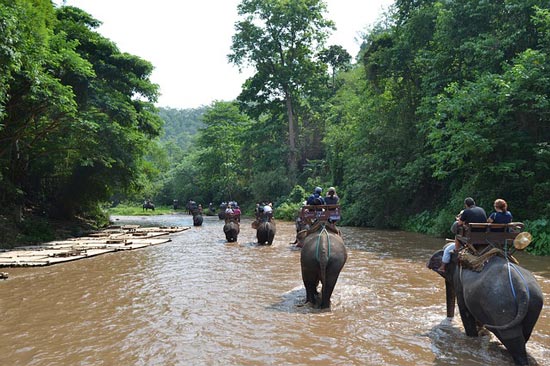
These elephants carry heavy loads, for most of the day, every day.
3. Camps Often Neglect Proper Feeding Standards
Elephants subjected to exploitative situations often endure inadequate care, leaving them without proper nutrition and access to sufficient water.
Typically, an adult elephant consumes an impressive 200 to 600 pounds of food daily, accompanied by up to 50 gallons of water. Meeting these dietary needs poses a considerable financial challenge for those responsible for the elephants' well-being.
Regrettably, due to the economic strain, many elephants are intentionally undernourished. This practice serves dual purposes: it allows owners to maximize their profits by cutting costs, and it renders the animals more tractable and docile in their weakened state.
This cruel approach not only compromises the physical health of these magnificent creatures but also contributes to a cycle of exploitation that further undermines their overall welfare.
4. Elephant Tourism Supports Pit Trapping
Elephants used for tourist rides are typically captured from the wild, a process that proves profoundly distressing for these highly intelligent and community-oriented animals, severely compromising their welfare and mental state.
The “pit trap” method employed in capturing wild elephants is particularly troubling and often results in fatalities. In this practice, domesticated elephants are coerced into corralling a wild herd into a corridor containing a deep pit, effectively trapping the animals as they fall in.
To make the process less tumultuous, protective and aggressive members of the wild herd are killed, inevitably resulting in injuries and fatalities during the undertaking. Shockingly, this method persists in parts of Thailand and Southeast Asia, primarily driven by the lucrative market value of baby elephants, which exceeds $30,000.
The ethical implications of this capture process underscore the urgent need for advocacy, awareness, and a shift towards responsible tourism practices to protect the well-being of these magnificent creatures.
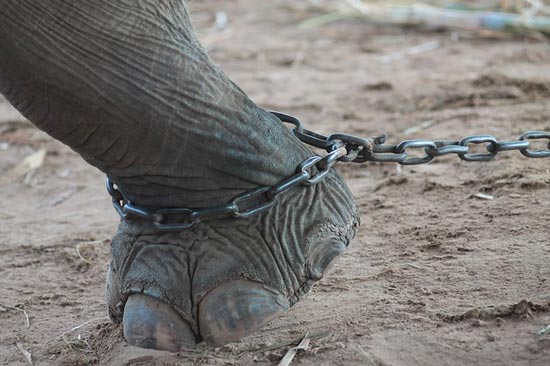
Enslaving wild animals is cruel.
5. Increased Mortality Rate
Elephants boast a substantial lifespan, ranging from 40 to 60 years, with females generally living longer than males, influenced by their lifestyle and environment.
Tragically, this natural lifespan can be dramatically curtailed by the harsh conditions of captivity, particularly instances of overwork and undernutrition. Countless elephants have faced premature death due to their involvement in tourism enterprises, serving as a stark reminder of the ethical considerations associated with activities like elephant riding.
It's imperative for tourists to reflect on the impact of their choices when considering participation in elephant riding centers. Beyond the immediate thrill for tourists, there is a significant and often overlooked toll on the well-being and longevity of these majestic creatures.
6. Psychological Damage
As mentioned earlier, the majority of elephants in captivity have been forcibly taken from the wild, subjected to brutal beatings, and coerced into submission by exploitative groups.
The psychological toll of such treatment on these intelligent animals is often underestimated by tourists and even mahouts. The consequences can be severe, leading to mental illnesses like depression and anxiety among elephants.
These conditions may manifest in unpredictable and potentially dangerous ways, including angry outbursts, especially for those in close contact with the distressed animals.
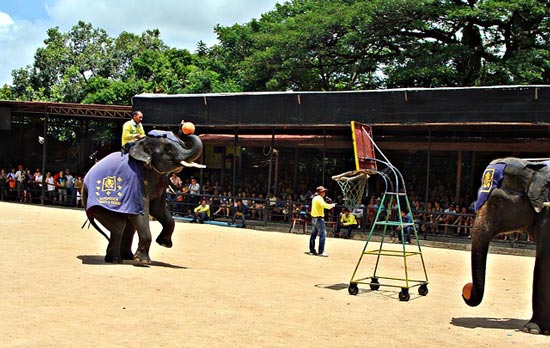
Elephants were not born to be exploited by humans in this way. These shows, made possible through force, can turn elephants mad and make them a risk to themselves and spectators.
7. Encouraging Street Begging
Supporting elephant riding extends endorsement to a range of questionable and inherently cruel practices, including the distressing act of street begging.
In certain urban settings, mahouts, responsible for elephant training, lead these majestic animals through city streets, prompting them to perform tricks for financial gain or selling fruit for tourists to feed them.
Regrettably, this practice is another poignant example of the cruelty elephants endure. The bustling sights, loud sounds, and dense crowds of urban environments can overwhelm these sensitive creatures, causing significant stress and anxiety.
Furthermore, the hazards of city streets pose serious threats to the well-being of elephants. The hot pavement can scorch their sensitive feet, while debris like broken glass and litter can lead to injuries. Such injuries escalate the risk of complications, including blood poisoning and infections, often culminating in fatalities.
8. Riding Elephants Can Be Dangerous – for Them & You
Although elephants are renowned for their gentle dispositions, riding them carries undeniable dangers. Elephants, like any wild animals, can exhibit unpredictable behavior, particularly when stressed or in heat.
Due to this inherent risk, allowing children to ride elephants is unwise, and riding them as adults is not only unwise but also unkind. The unpredictability of these massive creatures was tragically demonstrated in 2016 when a British tourist lost their life after being thrown from, trampled, and gored by an elephant during a trek on the Thai island of Koh Samui. Astonishingly, the elephant was only given a two-week break before resuming work.
More recently, in 2023, a couple narrowly escaped death but suffered severe injuries when a disgruntled elephant threw off its mahout and took the tourists on an unexpected ride. Nicole Siri and Mark Martin were forced to leap from the carriage, positioned 10 feet off the ground, after the elephant they were riding went rogue. The consequences were devastating, with Martin sustaining a broken back and shattered pelvis, while Siri suffered a fractured back.
See the video below:
Additionally, riding elephants can also pose a health risk to those in close contact. There have been known cases of elephants with tuberculosis spreading the disease to their handlers.
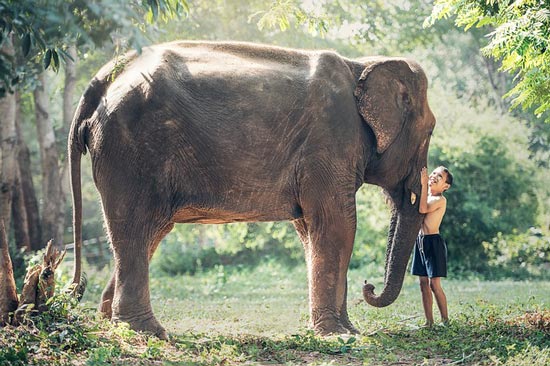
Elephants don't want to hurt people, so don't force them to.
9. Neglect
What transpires when an elephant is no longer able to partake in tourist rides? What occurs when these majestic creatures become unpredictable, turning on both tourists and their mahouts? What unfolds when the hefty veterinary bills far exceed the income generated from the tourist industry?
In such unfortunate circumstances, the elephant transforms from a source of income to a burdensome business expense that can no longer be recouped.
Tragically, many elephants faced with this plight are subjected to neglect and abandonment. Left to languish on wasteland or inadequate fields, they are denied access to the broad variety of plant matter essential for optimal nutrition.
10. Potential Extinction
In the early 1900s, Thailand was home to an estimated 100,000 domesticated or captive elephants. Fast-forward to mid-2007, and a stark decline is evident, with only approximately 3,456 domesticated elephants remaining in Thailand, alongside roughly a thousand wild elephants (Wikipedia)
A significant factor contributing to the diminishing elephant population in Thailand is the prevalence of elephants used in tourist attractions, a staggering 60% of which, as of 2014, were sourced from neighboring Myanmar.
In Myanmar, rampant poaching and illegal capture pose severe threats to the already dwindling wild elephant population. This cross-border exploitation further underscores the urgent need for international cooperation and advocacy to address the complex challenges faced by elephants, both in Thailand and across the region.
What You Can Do to Help
The prevalence of working elephants in Thailand persists, and unfortunately, the practice of riding shows no signs of diminishing despite facing significant backlash from animal rights activists, lawmakers, and concerned tourists.
The profitability of elephant riding camps not only sustains this controversial practice but also fosters the existence of other exploitative animal industries within the Kingdom and Southeast Asia (SEA). A glaring example is the infamous Tiger Temple, known for unlawfully taking tiger cubs from the wild, restraining them, and drugging them for tourists seeking close encounters with these majestic creatures.
When tourists contribute to unethical animal encounters by spending money on such attractions, they inadvertently fuel the demand for these markets, perpetuating a cycle of animal cruelty. As a conscientious tourist, the most impactful action you can take is to vote with your dollar.
Always opt for interactions and experiences that prioritize the well-being of the environment, animals, and the local community. By making ethical choices, you actively support a more compassionate and sustainable approach to tourism.
Share Responsible Photos/Videos
Let's be frank: many individuals engage in exploitative animal industries primarily for the sake of taking photos. However, using photography as the sole motivation for participating in an industry known for its unethical and even hazardous practices is a rather weak justification.
Partaking in elephant riding and subsequently sharing photos of such experiences on social media contributes to the normalization of an inherently problematic behavior and activity. The unfortunate reality is that many people may not be fully aware of the ethical concerns and dangers associated with these practices.
Instead, consider redirecting your efforts toward visiting an elephant sanctuary, where you can capture and share photos that depict the stark contrast between elephant conservation and exploitation.
By sharing these images on platforms like Facebook, Instagram, and Tik Tok. you play a crucial role in raising awareness and educating others about the importance of making ethical choices when it comes to interacting with animals.
Watch the interesting documentary below by clicking the play button.
How to See Elephants in Thailand
Fortunately, some organizations are actively working to combat the exploitative elephant riding industry. Recently, TripAdvisor made a commendable decision to cease selling tickets to attractions that offer tourists the opportunity to ride elephants, dolphins, and tigers. This move aligns with a broader commitment to ethical tourism.
For those eager to encounter elephants on their Thai trip, it's crucial to recognize that a meaningful interaction doesn't necessitate riding these magnificent creatures. Ethical elephant sanctuaries, dedicated to providing the right environment and proper nutrition, offer an alternative. Here, you can engage with elephants on their terms, participating in activities such as feeding, washing, and interacting with them in a neutral environment.
Choosing such sanctuaries ensures that your money contributes to the care of these elephants rather than their exploitation. Elephant Nature Park in Chiang Mai stands out as one of the most popular and reputable sanctuaries globally. Renowned for its educational initiatives, ethical practices, clean and safe facilities, and qualified keepers, the organization is dedicated to the care and rehabilitation of these gentle creatures.
+ Book an ethical elephant trip in Thailand
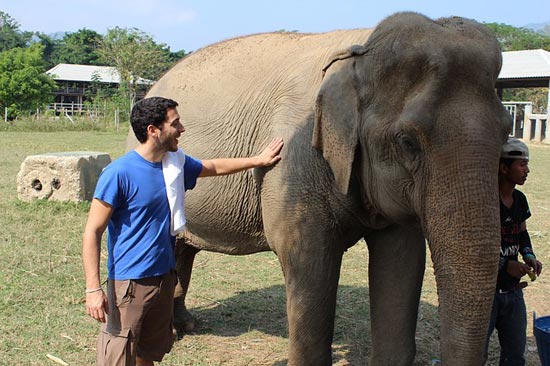
Visit an ethical sanctuary and help take care of old, injured and abused elephants.
